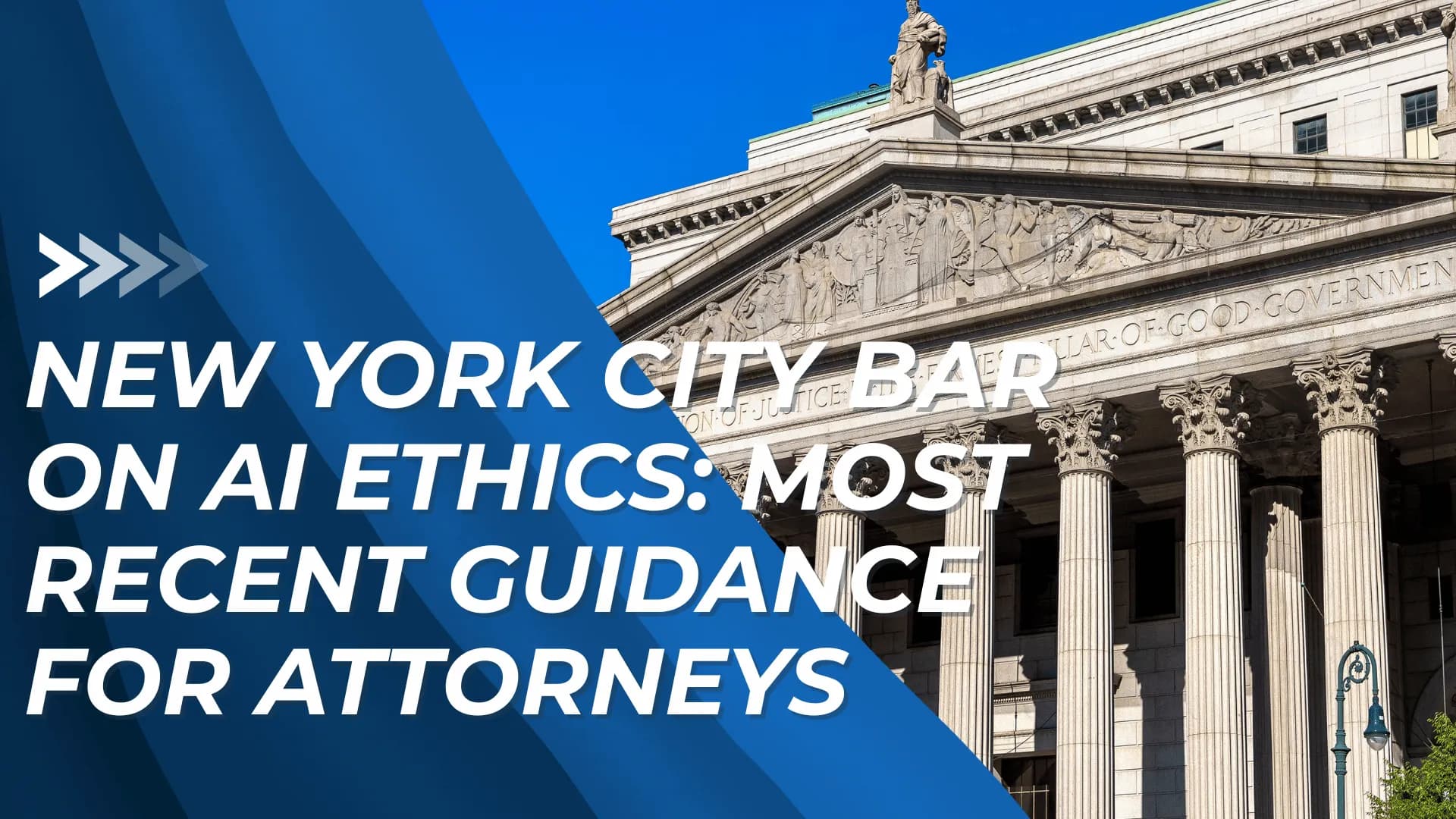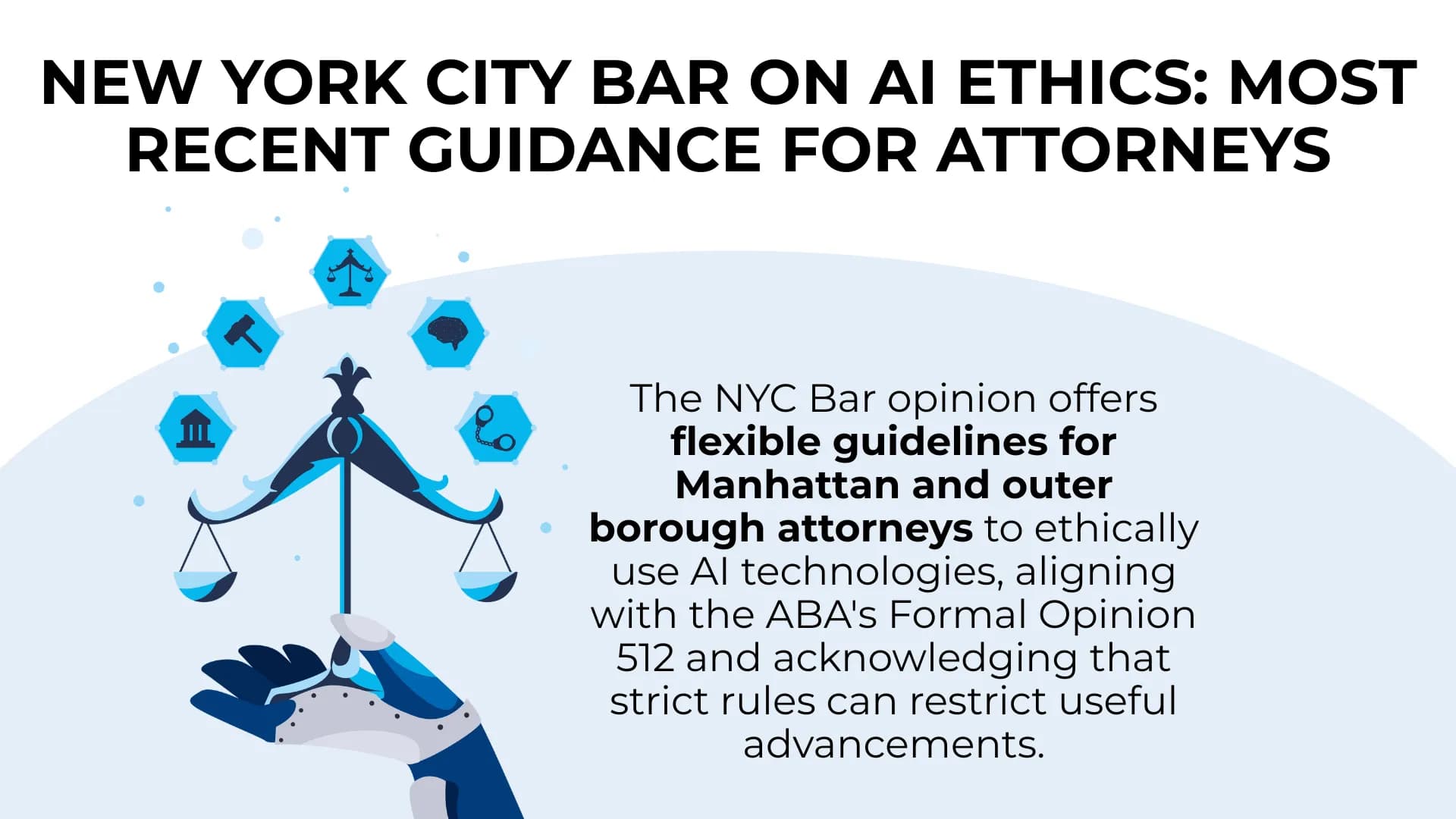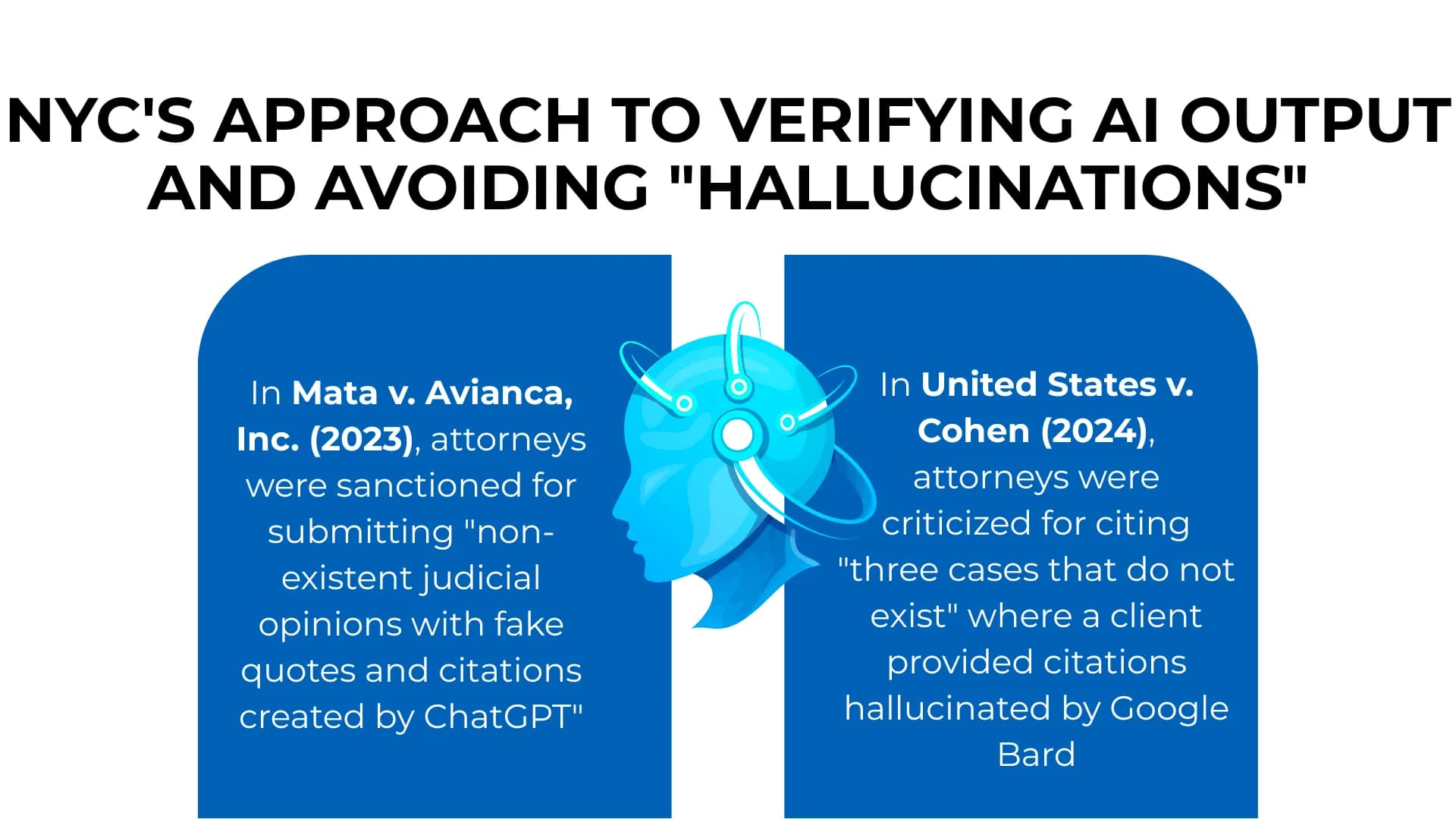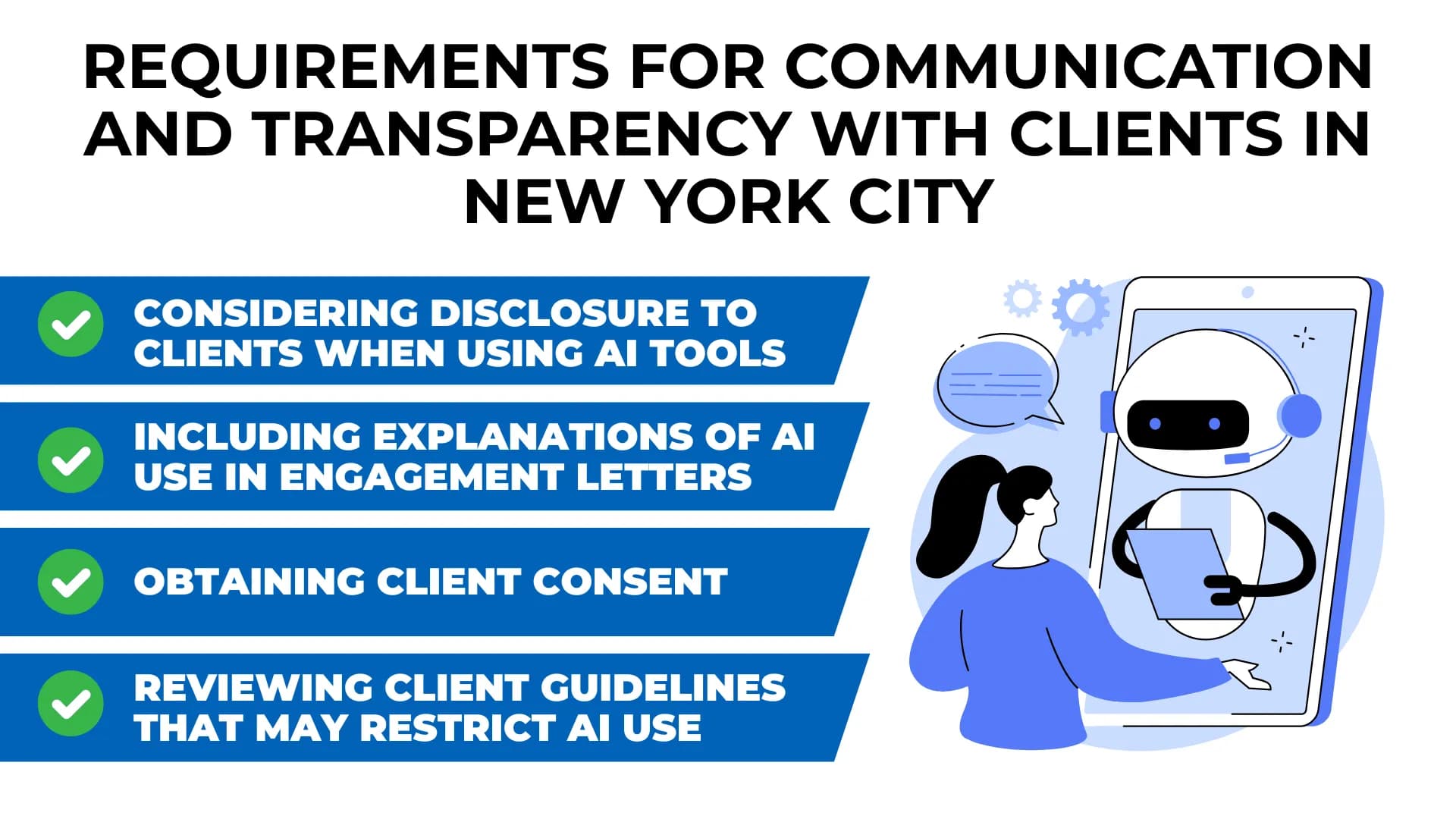New York City Bar on AI Ethics: Most Recent Guidance for Attorneys


Artificial intelligence is transforming the legal profession at a remarkable pace, offering powerful new tools for research, document drafting, and case management. For solo and small firm attorneys in New York City, these technologies present both significant opportunities and ethical challenges. The New York City Bar Association's Professional Ethics Committee recently released Formal Opinion 2024-5, providing comprehensive guidance on navigating the ethical use of generative AI in legal practice.
Rather than imposing rigid restrictions, the NYC Bar opinion offers flexible guardrails designed to help Manhattan and outer borough attorneys comply with their existing ethical obligations while leveraging AI technologies. This approach aligns with similar guidance from the American Bar Association (Formal Opinion 512) and other state bars. It recognizes that overly strict rules might hinder beneficial technological advancement.
Let's explore the key ethical considerations that NYC solo and small firm attorneys should understand when incorporating AI into their practice.

NYC's Guidelines on the Duty of Confidentiality
Client confidentiality remains paramount when using AI tools in New York practice. The NYC Bar opinion highlights several critical aspects of this duty:
- Generative AI systems may use inputted information for training purposes or share it with third parties, creating potential confidentiality risks
- Without client consent, New York lawyers must not input confidential information into these "open" AI systems that share data with third parties
- Even with consent, NYC attorneys should avoid entering identifying client details
- "Closed" systems that keep information within a firm's protected databases present fewer risks
- Lawyers in the five boroughs should review AI providers' Terms of Use to understand how information is handled and stored
- Periodic monitoring of Terms of Use is necessary as they can change frequently
For NYC solo practitioners without dedicated IT departments, this may mean investing time in understanding how various AI platforms handle data. Alternatively, they might need to consult with IT professionals to ensure appropriate confidentiality protections.

Standards for Competence and Diligence in New York
The duty of competence extends to understanding the AI tools a New York attorney chooses to use. The NYC Bar opinion emphasizes:
- New York lawyers should be aware that AI outputs may include false, inaccurate, or biased information
- Understanding AI tools' capabilities, limitations, and Terms of Use is essential for NYC practitioners
- Professional judgment cannot be delegated to AI—it remains the New York lawyer's responsibility
- AI outputs must be carefully scrutinized, verified, and corrected as necessary
- Any AI-generated research or arguments must be supplemented with human-performed research and analysis
Clearbrief's Mistake Detection feature helps NYC attorneys fulfill this ethical obligation by automatically flagging discrepancies between written claims and their sources. This prevents potential AI hallucinations before they lead to ethical violations or court sanctions.

NYC's Approach to Verifying AI Output and Avoiding "Hallucinations"
Perhaps the most publicized risk of generative AI is its tendency to "hallucinate" or fabricate information, such as non-existent legal precedents. The NYC Bar highlights several high-profile cases where attorneys faced sanctions for submitting AI-generated false citations:
- In Mata v. Avianca, Inc. (2023), attorneys were sanctioned for submitting "non-existent judicial opinions with fake quotes and citations created by ChatGPT"
- In United States v. Cohen (2024), attorneys were criticized for citing three nonexistent cases where a client provided citations hallucinated by Google Bard
The NYC opinion emphasizes that lawyers must review all AI outputs, especially legal citations and analysis, for accuracy before using them in client work or submitting them to New York courts. Attorneys should also be aware of court rules requiring certification that AI-drafted filings have been human-checked.

Requirements for Communication and Transparency with Clients in New York City
Transparency about AI use builds trust with New York clients and aligns with ethical obligations. The NYC Bar recommends:
- Considering disclosure to clients when using AI tools that aren't generally understood to be routinely used by New York lawyers
- Including explanations of AI use in engagement letters, particularly when it affects strategy or billing for NYC matters
- Obtaining client consent if confidential information will be disclosed through AI use
- Reviewing client guidelines that may restrict AI use in their Manhattan matters
The NYC opinion notes that because some AI is now routinely used (such as in Microsoft Word's grammar checking), not all AI use requires special disclosure. However, when a New York client specifically requests that no AI be used, attorneys should discuss this with the client before agreeing.

NYC Standards for Billing and Fee Considerations
AI can dramatically improve efficiency, raising questions about ethical billing practices for New York attorneys:
- NYC attorneys may charge for actual time spent using AI (crafting prompts, reviewing outputs)
- New York lawyers must not charge hourly fees for time saved through AI use
- AI-related costs should be disclosed in advance to clients as required by NYC Rule 1.5(b)
- Alternative fee arrangements might better reflect AI efficiency than traditional hourly billing
This area presents both opportunities and challenges for small firm attorneys in Brooklyn, Queens, and Manhattan. They may benefit from reduced work time while needing to adjust their billing practices to maintain ethical compliance.

NYC Guidance on Supervision and Avoiding Unauthorized Practice
AI tools should be treated similarly to non-lawyer assistants, requiring appropriate supervision by New York attorneys:
- Managerial NYC lawyers should establish clear policies for AI use
- Staff in New York practices should receive training on AI capabilities, limitations, and ethical considerations
- Human oversight must be maintained to avoid unauthorized practice of law in New York
- AI chatbots used for client intake require particularly careful supervision
Clearbrief's Fact-Citing and Verification features help NYC small firm attorneys maintain proper supervision. These tools allow easy verification that AI-generated content is supported by accurate evidence, ensuring compliance with Rules 3.1 and 3.3 regarding candor to tribunals and meritorious claims.

NYC Requirements for Data Security and Client Protection
Securing client information when using AI tools is essential for New York practitioners:
- NYC attorneys should consult with IT professionals to ensure AI systems adhere to security protocols
- Confidentiality agreements with third-party AI vendors may be appropriate
- Regular auditing of AI tools for compliance with New York data protection standards is recommended
Clearbrief's SOC 2 certification and robust security features allow NYC solo practitioners to use AI confidently while maintaining client confidentiality in compliance with Rule 1.6. This addresses a critical concern for small firms without dedicated IT security teams.

Conclusion: Legal AI Ethics in NYC
The NYC Bar's guidance provides practical direction for solo and small firm attorneys in New York looking to ethically incorporate AI tools into their practice. Rather than discouraging AI adoption, the opinion offers a framework for responsible use that protects client interests while leveraging technological benefits.
By understanding these ethical considerations—confidentiality, competence, verification of outputs, transparent client communication, appropriate billing, proper supervision, and data security—New York small firm attorneys can confidently integrate AI tools. This enhances their practice efficiency while maintaining professional standards.
As AI technology continues its rapid evolution, staying informed through continuing education and NYC bar association updates will be essential. The NYC Bar's guidance provides a foundation for responsible AI adoption rather than imposing rigid restrictions. This allows attorneys to ethically enhance their practice while protecting client interests.

